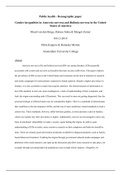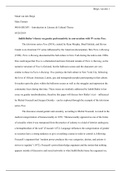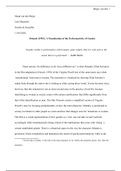Amsterdam University College (AUC) • Liberal Arts and Sciences
Meest recente samenvattingen voor de opleiding Liberal Arts and Sciences op de Amsterdam University College (AUC). Op zoek naar een samenvatting voor Liberal Arts and Sciences? Wij hebben diverse samenvattingen voor de opleiding Liberal Arts and Sciences op de Amsterdam University College (AUC).
-
11
- 0
- 0
Vakken Liberal Arts and Sciences op de Amsterdam University College (AUC)
Er zijn samenvattingen beschikbaar voor de volgende vakken van Liberal Arts and Sciences op Amsterdam University College (AUC)
Nieuwste samenvattingen Amsterdam University College (AUC) • Liberal Arts and Sciences
Anorexia nervosa (AN) and bulimia nervosa (BN) are eating disorders (EDs) generally associated with women and not seen as disorders that men can also suffer from. This paper explores the prevalence of EDs in men in the United States and comments on the lack of attention in research and media campaigns for male patients compared to female patients. Despite a higher prevalence in females, it is also a problem in males that requires attention. The limited amount of information on how EDs manifest i...
A description of the tools of communication that are used in the book Humans of New York
Without light/fire we would have not been able to move in darkness, keep our bodies warm or hunt the food for our survival, therefore humans have used the elements available to build ways that render survival possible. “Media do not emerge independently and outside of specific historical practices”, that is to say, the tools to contain fire exist for a reason, they did not appear out of nothing (Siegert 52). However, “history is itself a system of meaning that operates across a media-techn...
The television series Pose (2018), created by Ryan Murphy, Brad Falchuk, and Steven Canals is an American TV series influenced by the American documentary film Paris is Burning (1990). Paris is Burning documented the ball culture in New York during the mid-to-late 1980s. One could argue that Pose is a dramatized and more fictional remake of Paris is Burning, as the narrative structure of Pose is fictional, but the ballroom scenes and the characters are very similar to those in Paris is Burning. ...
This paper will focus on how The Anne Frank House is positioned within commemoration culture in relation to trauma tourism, the commodification of memory, and the concept of post-memory. The Anne Frank House is an intriguing case study because it differs slightly from other memorial sites in so far as it is a memory site as well as a monument – it is the actual place of trauma instead of a place that got assigned to represent trauma, which changes how visitors interact with the space because t...
This paper will discuss how the people attending Vrankrijk and the interior of the bar can be considered part of a subculture, relating its characteristics to multiple aspects Dick Hebdige discusses in his essay on subculture.
The film Orlando creates a simplified version of Virginia Woolf’s story by focusing predominantly on how the main character, Orlando, is positioned in society in relation to other people as a man and how that changes once he transitions to woman. The film is a visual representation of how gender is a ‘role’ one can take on and ‘perform’ accordingly while simultaneously being critical of the implications that come with ‘doing’ a certain established gender. The contextualisation of ...
This paper lays out the ways in which the American Eugenics Movement was organized, and how ‘unfit human traits’ are produced through a eugenic lens. Looking at the use of language that produces categories of ‘unfitness’ will provide the groundwork for looking at how categories of ‘(un)fitness’ are constituted in society and how they’re still institutionalized today and thus continue to produce a concept of humanness that excludes and erases ‘the Other’. I will specifically loo...
To gain a better understanding of the different possible trajectories of ‘Affect theory’, this paper aims to synthesize and compare Sarah Ahmed’s text “The Cultural Politics of Emotion” (2014), particularly chapter 2 “The Organisation of Hate” and Brian Massumi’s “Autonomy of Affect” (1995).
This paper explores the portrayal of systematic racism in Get Out through analysis of the stereotypes that exist around black people and the capitalist notions that one needs to be able to participate in society in a productive way that generates money.










